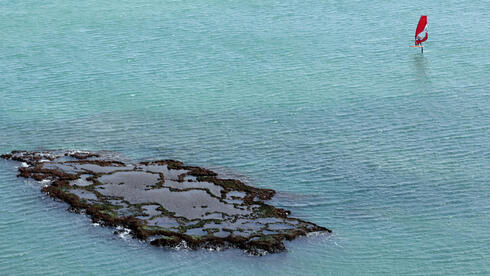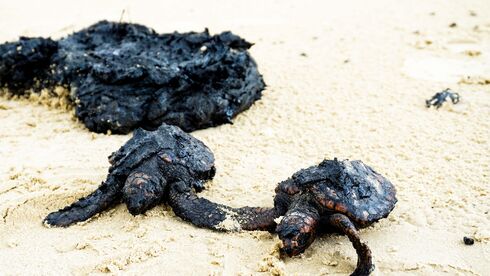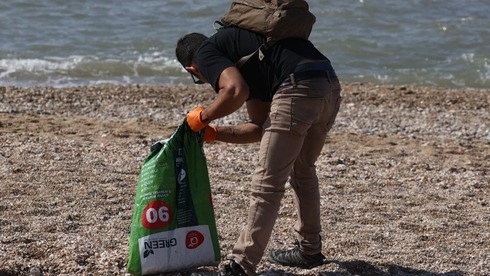The Environment Ministry cleared the Miinerva Helen of blame for the worst oil spill in the country’s history following a ‘professional and comprehensive inspection’

Zafrir Rinat Nir Hasson Feb. 28, 2021
The Minerva Helen, a Greek tanker, has been cleared of suspicion for the oil spill that polluted large stretches of Israel’s Mediterranean coastline in mid-February, the Environmental Protection Ministry said on Sunday following an inspection of the ship.
On Saturday, a team of Israeli investigators from the ministry’s marine environment protection division examined the tanker, which is anchored at the port of Piraeus.
The ministry said that, following a “meticulous, professional and comprehensive” investigation carried out in cooperation with the authorities in Greece and without advance notice to the ship’s operators, it was ruled out the ship as the source of the spill.

Tar from the leak washed up on more than 170 kilometers (106 miles) of Israel’s beaches, affecting 40 percent of the country’s coastline.
When the pollution surfaced, the ministry identified roughly 10 ships in the region as possible culprits. Subsequently the names of dozens of other ships were added to the list. The list of suspected ships was again narrowed to about 10, with assistance from foreign officials.
Environmental Protection Minister Gila Gamliel tweeted that Israel would continue to pursue the source of the pollution and bring the polluters to justice.

“We are committed to make every effort to locate the ship responsible for the pollution of Israel’s beaches. We have a moral duty to the public [and to] the wildlife and nature that was harmed by the pollution,” she wrote on Twitter.
“This pollution has an address. We will not ignore an environmental crime and we will use every means to find the perpetrators,” Gamliel added.
On Tuesday, an Israeli court partially lifted a gag order on the investigation.
Although the Minerva Helen had been mentioned by a number of Israeli media outlets as the suspected source of the massive spill, the ship’s operator, the Minerva Marine Company, told Haaretz that it denied any responsibility.
Between February 4 through February 11, the ship was off Port Said in Egypt, without any cargo on board, awaiting further orders and was not involved in any activity that could have been linked to the oil spill, according to the company.
After the pollution was first spotted on February 17, the Environmental Protection Ministry said the most likely source of the oil was an unreported spill of perhaps dozens of tons of oil from a tanker. The ministry has not yet disclosed the type of oil involved, but researchers from Hebrew University’s Hermann Institute of Earth Sciences who collected samples of the tar said that they believe it is from crude oil.
The Israel Nature and Parks Authority said last week that most of the country’s Mediterranean beaches have been cleared of large pieces of tar, but that tiny fragments of tar were more difficult to remove. In addition to the tar, other debris including plastic, tree limbs and shells are being removed. After the debris is analyzed, a final decision will be made regarding necessary further steps, a cleanup that could take years, the authority said.
Israel widens search for oil spill culprit after ruling out ship in Greece – YNET
The investigation focuses on an unidentified ship that passed about 50 km (30 miles) off the coast on February 11 as the likely source of what environmental groups are calling an ecological disaster that could take years to clean up
Reuters, Ynet | Published: 02.28.21
Israel on Sunday broadened its search for the ship behind an oil spill that blackened its beaches with tar after investigators ruled out one of the suspected tankers.
An Israeli team, in coordination with Greek authorities, carried out a surprise inspection of the Minerva Helen while it was docked at Athens’ Piraeus port. The ship is no longer suspected of being responsible for the spill, said Israel’s Ministry of Environmental Protection.

Minerva Helen’s operator had denied any connection to the oil spill.Israel’s investigation has focused on an unidentified ship that passed about 50 km (30 miles) off the coast on Feb. 11 as the likely source of what environmental groups are calling an ecological disaster that could take years to clean up.

While thousands of volunteers and soldiers continued to clean the country’s beaches from clumps of sticky black tar and save marine wildlife, Israel reiterated its determination to find those responsible.The environment ministry, which has been working with European agencies, initially identified 10 ships for investigation. A number of these have since been ruled out and the ministry said it has broadened the search to include dozens of vessels.

“The oil spill had a source. We will not ignore the environmental crime and we will take every measure to locate the criminal,” Environmental Protection Minister Gila Gamliel said.On Saturday the Airforce confirmed it had detected another suspected oil spill making its way towards the Israeli shore 150 kilometers (93 miles) from the coast. The military aircraft were dispatched at the request of the Ministry for the Environment that had come under fire for failing to identify the ecological threat posed by the spill earlier in the month and to protect the shoreline from its effects.
https://www.ynetnews.com/environment/article/ryyz1WYzd
————————————————
Israel Sends Team to Greece to Inspect Ship Suspected of Causing Massive Oil Spill – Haaretz
The oil spill has polluted beaches covering some 40 percent of Israel’s Mediterranean coast

Zafrir Rinat Nir HassonFeb. 27, 2021
Israel has sent a team to inspect a ship docked in Greece it suspects may be responsible for the major oil spill that polluted Israel’s Mediterranean coast, the Environmental Protection Ministry said on Saturday.
The brief statement didn’t name the suspected ship or provide any further details from the investigation, which the ministry said was still ongoing.
A Greek Coast Guard official who declined to be named told Reuters Athens had not received any official request from Israel to inspect a Greek ship. Yet, Israel’s Environmental Protection Ministry said that they had worked in full cooperation with the Greek Foreign MInistry as required, and not directly with the team on board the ship in question.
Environmental Protection Minister Gila Gamliel said Wednesday that the oil pollution was caused by a single ship. The director of the ministry’s Marine and Coastal Environmental Division, Rani Amir, said that the source is one of several suspected ships, but that the ministry has excluded five ships that had initially come under suspicion.
On Wednesday, the Health Ministry announced a ban on the sale of fish and other marine life caught off the coast until further notice.
One of the obstacles to the investigation, Gamliel said, has been that Israel does not have authority to stop ships in the open sea. Amir added that the ministry had asked for a gag order in the case due to concern that the operator of the polluting ship would seek to obstruct the investigation.
Meanwhile, researchers at the Hebrew University of Jerusalem said samples they collected from several beaches all have been found to be crude oil.
Prof. Alon Amrani of the university’s Institute of Earth Sciences said that according to the team’s findings, which were also shared with the Environmental Protection Ministry, the pollution most probably couldn’t have been caused by ship fuel.
Animals have been found covered with tar, including a few birds and nine sea turtles. Four of the turtles died, while the others were taken to the National Sea Turtle Rescue Center at Mikhmoret between Tel Aviv and Haifa. There they were fed in an attempt to increase their metabolism and dilute the oil in their bodies.
On Tuesday, the Israel Nature and Parks Authority reported that most of the beaches along the coast have been cleared of large pieces of tar, but that small fragments of tar are more difficult to remove. The vast majority of tar and other debris that has been removed from the beaches has been done by volunteers.
Reuters contributed to this report.
————————————————–
